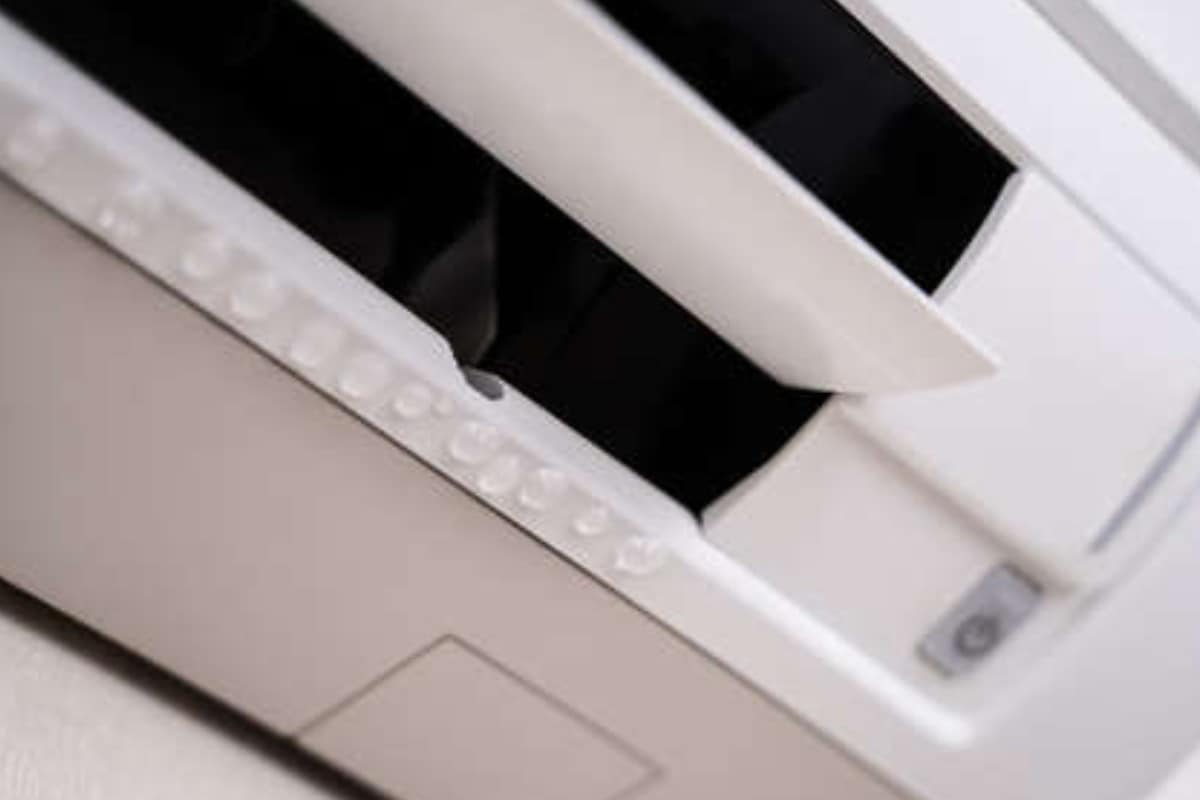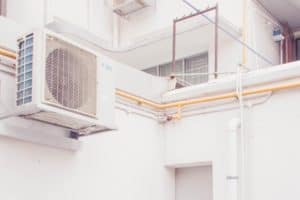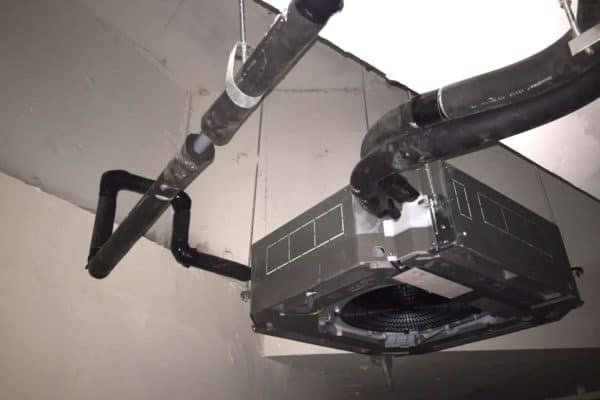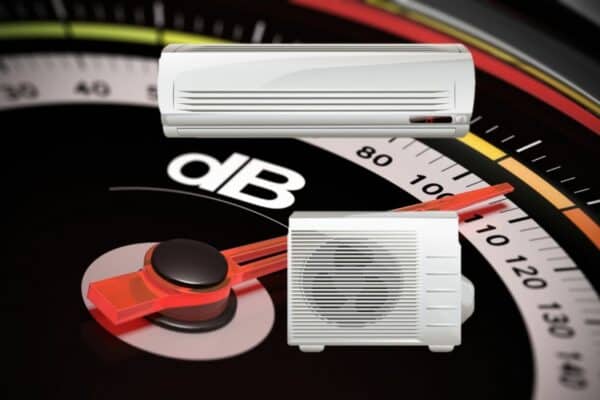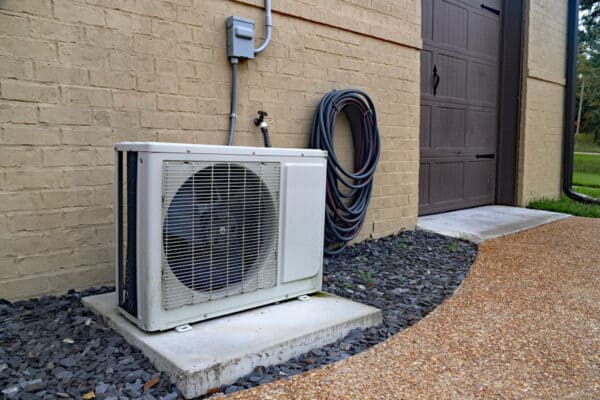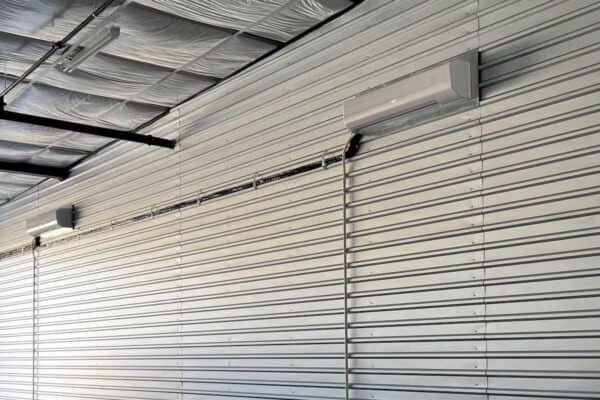Do Air Conditioners Use and Connected to Water?
Air conditioners always produce water during operation. Their pipes are concealed in the wall and we can’t see where it is connected to. Thus, do air conditioners use water?
Air-cooled air conditioners don’t need water to operate as they draw outside air to cool their condenser. On the other hand, water-cooled air conditioners rely on water to cool their condenser and thus, they consume water due to the evaporation at the cooling tower.
Most air conditioners don’t use water for their cooling process. The water coming out from an air conditioner is due to condensation where water vapor in the air changed into liquid water and it is normal. However, water-cooled type air conditioners do use chilled water to provide cooling.
People sometimes get confused when they heard people say some air conditioners use water which they are referring to water-cooled type. Most residential air conditioners are air-cooled type and they don’t use water as part of their cooling process.
How Air Conditioners Produce Water?
Air conditioners produce water using the condensation process to change water vapor in the air into liquid water. The liquid water produced by air conditioners is sometimes called condensate water. Condensation occurs when the air contact with cold surfaces that are below dew point temperature.
What is Dew Point?
Dew point is a temperature point which the air is at its maximum limit to hold a certain amount of water vapor. If the air is further cooled below the dew point temperature, it no longer able to hold the same amount of water vapor. Hence, some water vapor has to leave the air and becomes liquid water by itself and this process is called condensation.
For instance, if you bring a cup of iced coffee to a room which has a temperature of 28°C and 70% RH (RH is the amount of water vapor in the air), liquid water will form around your cup because the dew point of the air in the room is 22°C but the surface temperature of your cup is probably around 10°C. That’s why when you bring a cup of hot coffee to the same room, liquid water never forms around your cup because the surface temperature of your cup is probably around 60°C.
Use a Dew Point Calculator to determine the dew point of air at a given temperature and relative humidity (RH).
Basic Working Principle of Air Conditioners
An air conditioner has a certain amount of refrigerant circulating between its indoor unit and outdoor unit. The refrigerant is cold at the indoor unit and hot at the outdoor unit. The cold refrigerant absorbs the heat at the indoor unit and releases the heat at the outdoor unit.
So, how does the air condenses inside an air conditioner? Cold refrigerant running through the cooling coil makes the surface temperature of the cooling coil drop below the dew point temperature, causing water vapor in the air to condense into liquid water when the air came into contact with the cooling coil.
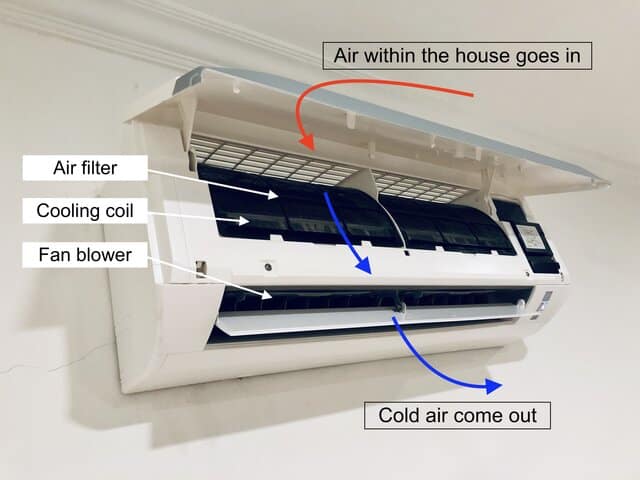
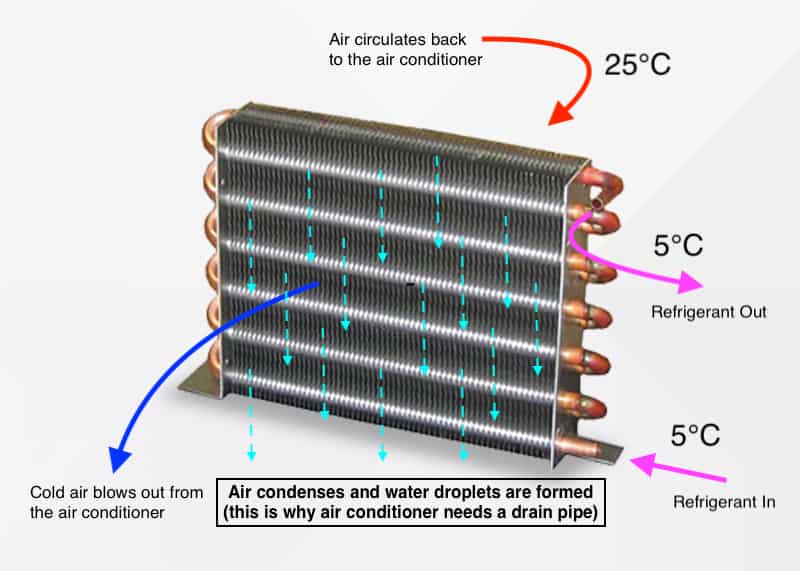
Typically, the cold refrigerant is around 5°C when entering and leaving the cooling coil. Because the cooling coil is made of highly conductive materials, the surface temperature of the cooling coil is nearly 5°C as well. Consequently, air contact with the cooling coil of an air conditioner will condensate and forms liquid water. This is how air conditioners produce water during their cooling process.
Read about: Why Copper Pipes Are Used in Air Conditioning?
Why Do Air Conditioners Condensate?
Air conditioners condensate to reduce the amount of water vapor in the air to a level that is comfortable for most humans. Although everyone has their own preference, people generally feel most comfortable in an environment where the room temperature is around 24°C and the relative humidity is around 50%.
Thus, air conditioners not just reduce the room temperature but also reduces the humidity of air so that the room is air-conditioned to a comfortable level.
Why Water Comes Out from an Air Conditioner?
If you see water coming out from an air conditioner, it may be due to one of the following:
- Clogged drain pipe – Drain pipe is blocked by slimes or foreign objects, stopping the flow of water and causing the condensate water to overflow at the indoor unit of the air conditioner.
- Hot air contact – Hot air came into contact with a part of an air conditioner that has a surface temperature below the dew point of the hot air and condensation occurred.
- Low in refrigerant – Too less amount of refrigerant causing more-than-normal drops in temperature when passed through the expansion valve, resulting in the freezing of the cooling coil.
- Low airflow – The air filter or cooling coil of an air conditioner is dirty, resulting in a more-than-normal reduction of airflow. Air travel slowly through the cooling coil became too cold, colder than the dew point temperature, and causing condensation.
- Improper installation – Water leaks from drain pipe joints or cracks.
More about: AC Leaking Water: Symptoms, Causes, Fix & Prevention
Can You Use the Water Produced by Air Conditioners?
The water produced by air conditioners is nothing but pure water, much like a distilled water. However, the cooling coil of an air conditioner is not clean and bacteria may grow inside the drain pipe of the air conditioner. Thus, we should not drink the water produced by air conditioners and it is not advisable to let your pets drink the condensate water as well.
Nevertheless, we can use the condensate water to flush toilets, wash floors, clean garden paving, wash cars, and others as long as the cleanliness of water is irrelevant. In addition, you can water your plants using condensate water but the condensate water has almost no nutrition.
Moreover, can we use air conditioner water in inverter batteries? It is not advisable to use air conditioner water to fill up an inverter battery. Although the quality of the water produced by air conditioners is very similar to a distilled water, the air conditioner water most likely contains dust, bacteria, and other substances which may damage the inverter battery in the long run.
What’s More?
- Read about: Does Air Conditioner Provide Oxygen?
- Read about: Does Air Conditioner Reduce Dust in Your House?
- Read about: The Effects of Outside Temperature on Air Conditioners
If you have anything to add (or ask) about this topic, leave a comment down below!


